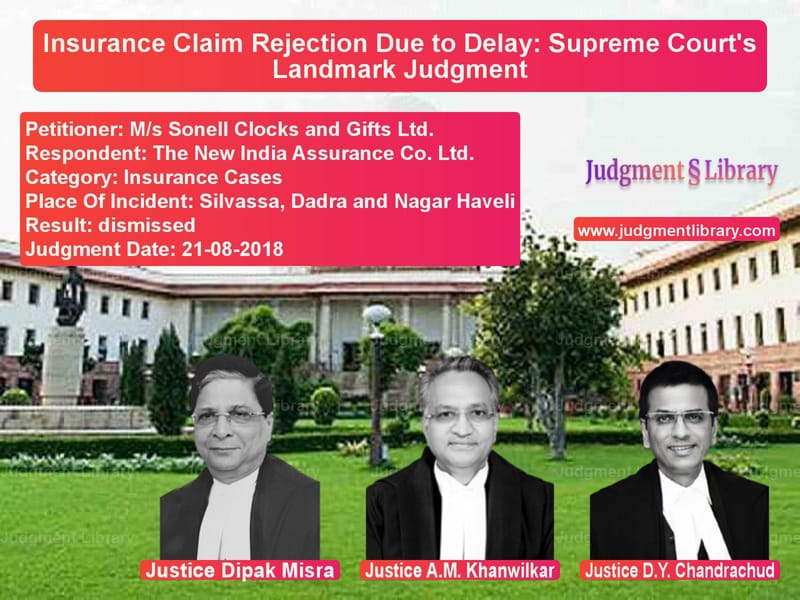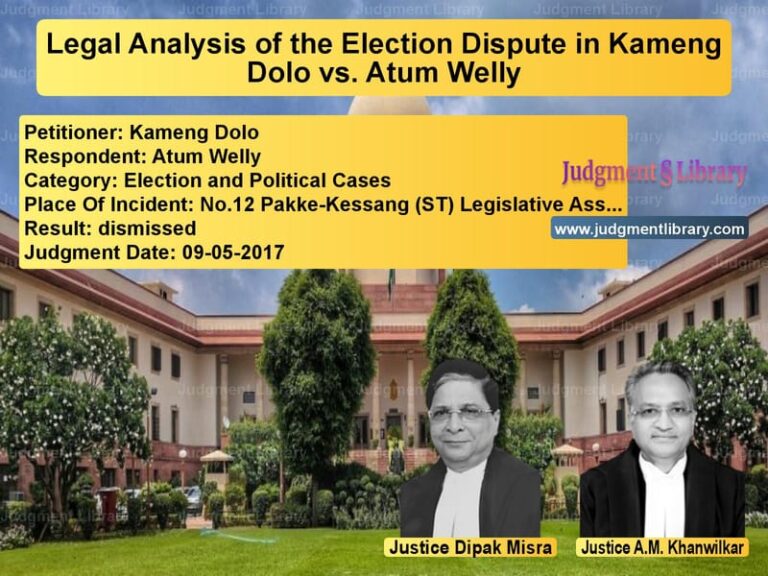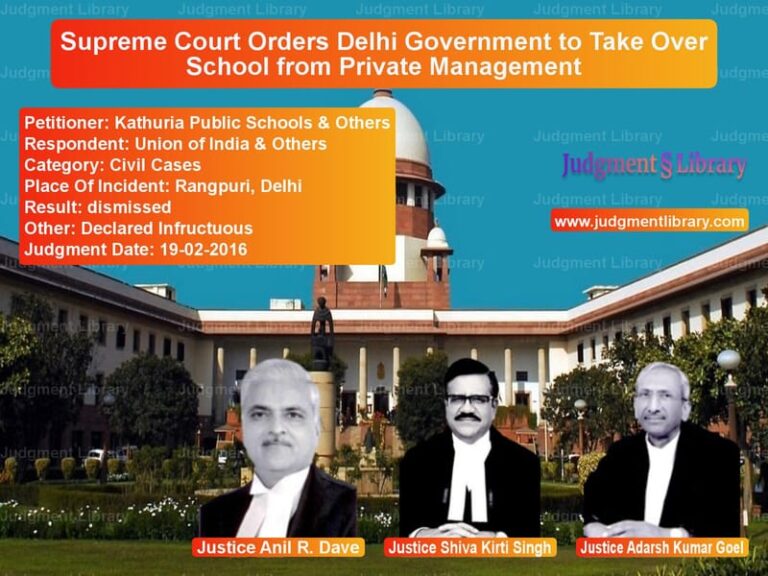Insurance Claim Rejection Due to Delay: Supreme Court’s Landmark Judgment
The Supreme Court of India delivered a crucial judgment in the case of M/s Sonell Clocks and Gifts Ltd. vs. The New India Assurance Co. Ltd., addressing the issue of whether an insurance company can deny a claim due to a delay in intimation. This case provides clarity on policy conditions related to intimation deadlines and whether an insurer’s actions can constitute a waiver of those conditions.
The Court examined the contractual obligations imposed on policyholders, the legal concept of waiver, and the consequences of a delayed claim intimation. The decision has significant implications for policyholders and the insurance industry regarding claim processing and adherence to contractual obligations.
Background of the Case
The appellant, M/s Sonell Clocks and Gifts Ltd., had taken an insurance policy from The New India Assurance Co. Ltd. for a period from 19 July 2004 to 18 July 2005. The policy covered the company’s building, plant, and machinery against various risks, including natural disasters.
On 4 August 2004, torrential rains and floods caused severe damage to the insured premises, affecting the machinery and raw materials. However, the company reported the loss to the insurer only on 30 November 2004, a delay of nearly four months. The insurer rejected the claim, citing a breach of Clause 6 of the insurance policy, which required immediate notification and submission of necessary documents within 15 days.
Petitioner’s Arguments
The appellant challenged the insurer’s rejection of the claim before the National Consumer Disputes Redressal Commission (NCDRC), alleging unfair trade practices and deficiency in service. The appellant contended:
- The insurance company had implicitly waived the requirement of immediate notification by appointing a surveyor to assess the damage.
- Despite the delay, the claim was legitimate, and the insurer had acted arbitrarily in rejecting it.
- As per consumer protection laws, the insurer should have considered the claim based on its merit rather than technicalities.
Respondent’s Arguments
The insurer defended its decision, arguing:
- The policyholder had violated Clause 6 of the insurance contract by failing to report the damage immediately.
- The delay of nearly four months severely impacted the insurer’s ability to verify and assess the damage accurately.
- The appointment of a surveyor did not constitute a waiver of policy conditions, as it was merely a procedural step required under insurance regulations.
National Commission’s Findings
The NCDRC ruled in favor of the insurer, holding that the appellant had failed to meet its contractual obligations. The Commission concluded:
- The policyholder had three obligations: immediate intimation, claim submission within 15 days, and an explicit declaration within six months if reinstatement was intended.
- Since none of these obligations were met, the insurer was justified in rejecting the claim.
- The appointment of a surveyor did not amount to a waiver of policy conditions.
Supreme Court’s Observations
The Supreme Court carefully analyzed the arguments presented and made the following key observations:
- “Waiver is an intentional relinquishment of a right. It must involve conscious abandonment of an existing legal right, which a party would otherwise have enjoyed.”
- “For waiver to apply, the insurer must demonstrate an unequivocal intention to relinquish its rights under the policy.”
- “The insurer’s appointment of a surveyor is a procedural necessity and does not automatically indicate a waiver of policy conditions.”
- “The requirement for immediate intimation exists to facilitate timely damage assessment, and non-compliance fundamentally affects the insurer’s ability to process claims fairly.”
Final Judgment
The Supreme Court dismissed the appeal, affirming the NCDRC’s decision that the insurer was justified in rejecting the claim. The Court held:
“The stipulation in Clause 6 requiring immediate notice is not a mere technicality but an essential requirement for claim assessment. The appellant’s failure to comply with this fundamental policy condition disentitles it from claiming insurance benefits.”
The ruling reaffirms that policyholders must strictly adhere to contract terms and that insurers are not obligated to entertain claims where mandatory conditions are breached.
Petitioner Name: M/s Sonell Clocks and Gifts Ltd..Respondent Name: The New India Assurance Co. Ltd..Judgment By: Justice Dipak Misra, Justice A.M. Khanwilkar, Justice D.Y. Chandrachud.Place Of Incident: Silvassa, Dadra and Nagar Haveli.Judgment Date: 21-08-2018.
Don’t miss out on the full details! Download the complete judgment in PDF format below and gain valuable insights instantly!
Download Judgment: Ms Sonell Clocks an vs The New India Assura Supreme Court of India Judgment Dated 21-08-2018.pdf
Direct Downlaod Judgment: Direct downlaod this Judgment
See all petitions in Insurance Settlements
See all petitions in Other Insurance Cases
See all petitions in Commercial Insurance Disputes
See all petitions in Judgment by Dipak Misra
See all petitions in Judgment by A M Khanwilkar
See all petitions in Judgment by Dhananjaya Y Chandrachud
See all petitions in dismissed
See all petitions in supreme court of India judgments August 2018
See all petitions in 2018 judgments
See all posts in Insurance Cases Category
See all allowed petitions in Insurance Cases Category
See all Dismissed petitions in Insurance Cases Category
See all partially allowed petitions in Insurance Cases Category







